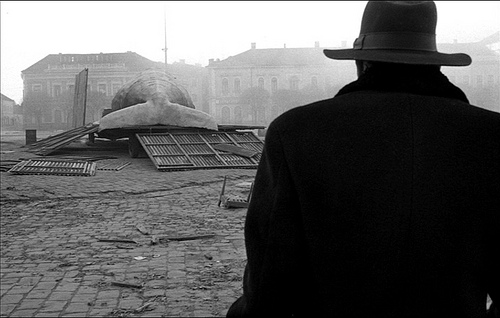
Werckmeister Harmonies
2000
Directed by Bela Tarr
Written by Laszio Krasznahorkai
Music by Mihaly Vig
Cinematography by Patrick de Ranter
Editing by Agnes Hranitzky
Based on the novel, The Melancholy of Resistance, by Laszio Krasznahorkai, Werckmeister Harmonies concerns a small Hungarian town and the controlling power of a travelling circus advertising the giant carcass of a whale, overseen by an unseen, obscure character, “the Prince.” Is this an allusion to a devil? Deceiver? Some embodiment of evil? One would think so, but along with all that is the ambiguity and apparent charisma of the character. One is reminded (perhaps only in a vague, unrelated way) of Godard’s Detective and two characters, both referred to as “the Prince” and representing an ambiguous and bizarrely existential relationship (they have nothing in common with each other in other words, but must’ve been mentioned for a reason, right?). Whatever Tarr’s “Prince” may represent, it is clear that he is to be seen as a corruptor, a charlatan who profits from the susceptibility of the masses.
Janos, a philosopher who instructs the local drunks in cosmology, is the central character of this story and represents the way of “reason” and “open-mindedness.” He serves as the audience connector, contrasting with the aimless, gullible, and superstitious townsfolk. Janos’ uncle, Gyorgy Eszter, is somewhat of an “elder” of the town, having an, often-alluded to, crowd-pleasing way with words. He is seen recording his philosophical musings on theorist, Andreas Werckmeister, and his (Werckmeister’s) influence on not only the convention of music theory, but the general philosophical outlook of man. Eszter suggests that a new way of thinking should be pursued; one in which a new form of theory is be established which would serve, more suitably, the harmony of man and music.
There is some startling imagery typical of Tarr’s style. A multitude of shivering, zombie-like men loiter around the circus procession (such as it is). They hover as if awaiting some unspoken event; brooding and fanatical in their silent vigil – just one of the many memorable, yet spare scenes.
Composed of only thirty-nine shots, Tarr has complete mastery over the cinematic form; exercising restraint in execution and exuberance for the mundane in a truly virtuoso and “effortless” directing style. Tarr was made to direct this film.
Now, is it a perfect film? By no means. Perhaps it’s almost contradictory to say so, but Tarr doesn’t afford enough time to the story. Considering one of Tarr’s best films is the 7-hour Satantango (1994) and that his style is characteristic of slow, methodical minimalism; it sounds ludicrous, but it must be said. I suppose adapting any novel to the screen accurately must allow for some inevitable loss in the translation, but although, Tarr has still created a wonderfully vast and convincing “world,” he doesn’t pursue it to the lengths that it could potentially be pursued. That may sound like nitpicking (and it is), but the film is a very different creature from the novel and, for better or worse, simpler and more general as well.
Overall Rating: * * * * * (5 out of 6)




No comments:
Post a Comment